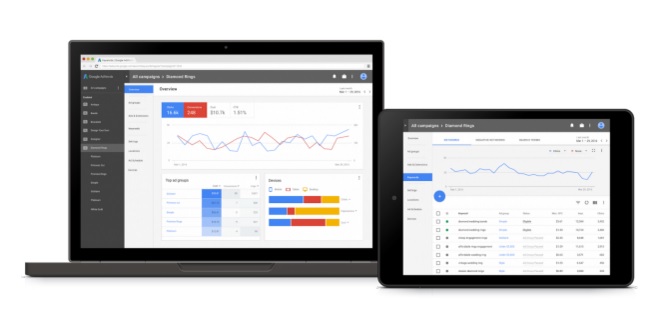Google’s 15-year-old AdWords platform is set for a major update to better help marketers reach consumers in a multi-screen world.

It is the first major overhaul of the AdWords interface in the last decade and a half and comes at a time of increasing complexity for marketers looking to connect with consumers not just on mulitple devices but through the medium of video and display via YouTube and Search.
The new look incorporates Material Design, the design language that’s at the core of Google apps like Maps, Search, and Gmail.
The last time Google touched up AdWords was way back in 2008.
“This re-imagining process is going to take some time, but we’re excited to finally talk about what we’ve been working on for the past year, year and a half,” said Paul Feng, AdWords product management director, by phone last week. AdWords head Jerry Dischler hinted at this overhaul in a keynote discussion at SMX Advanced in Seattle last June, now we are getting the first glimpse at what’s in store.
“The reason we’re rebuilding AdWords is because the world has changed so much in the past two years. AdWords is now over 15 years old and launched when Google was just figuring out what search advertising was. We rebuilt it several years ago for a desktop world — smartphones were only [a] year old. Now we are in probably the biggest shift since AdWords was introduced (and I’d argue perhaps ever) with mobile,” said Feng, “And there is now increased demand on marketers and on AdWords as a platform — advertisers are running ads in search, display, shopping, mobile, video. Ultimately, that’s why we’re re-imagining AdWords.”
Feng said the redesign has been informed largely by talking to advertisers across the spectrum.
Three common themes emerged.
· First, advertisers said it felt like AdWords has been built around products and features, rather than marketers’ needs and objectives. “How the navigation is laid out can be un-intuitive and comes with a high learning curve,” said Feng.
· Second, the platform has grown complex, with hundreds of features launching every year that stack up on each other.
· Third, the basic design looks and feels kind of dated. “The goal is to create a flexible platform for the future,” added Feng.
Selected advertisers will be invited over 2016/2017 to try it out and provide feedback.
Google said invites will be sent based on a number of factors, which it did not disclose but will include a range of advertisers both large and small.
Read the blog here
